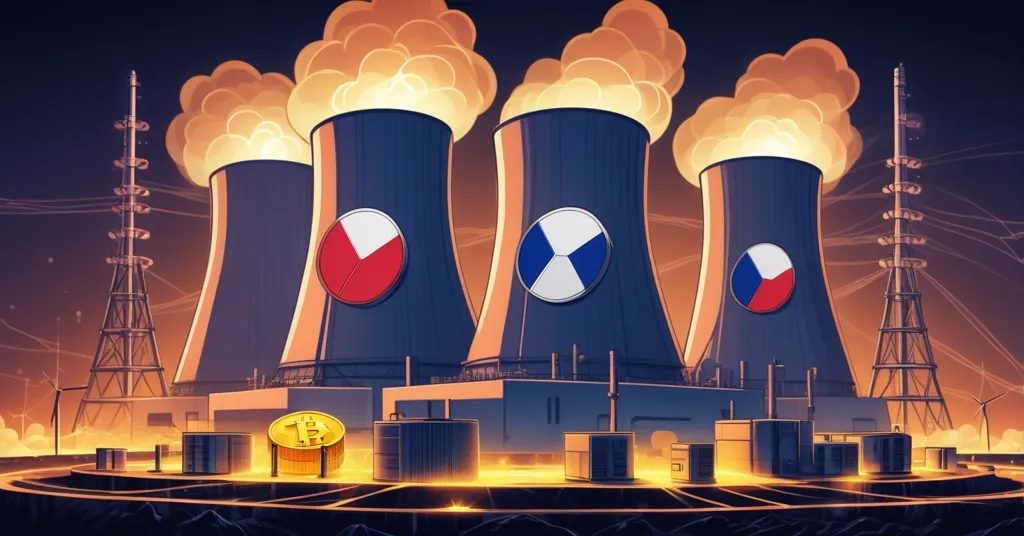France’s Nuclear Bitcoin Mining Proposal: Bold Innovation or Risky Gamble?

France’s Nuclear-Powered Bitcoin Mining Plan: Revolutionary or Radioactive Risk?
France is dropping a bombshell in the crypto space with a proposal to use surplus nuclear energy to mine Bitcoin, potentially becoming the first European nation to tie state-backed cryptocurrency operations to its power grid. Led by the far-right Rassemblement National (RN) party, this audacious plan could redefine how nations approach energy waste and digital assets—or crash spectacularly under its own ambition.
- Groundbreaking Proposal: RN’s bill, submitted July 11, 2025, to the French National Assembly, aims to use up to one gigawatt of surplus nuclear energy for Bitcoin mining.
- Financial Hopes: A five-year pilot program targets $100 million to $150 million in annual profits, though the math remains murky.
- Political U-Turn: RN leader Marine Le Pen, once a crypto hater, now pitches this as a national economic win.
France’s Nuclear Surplus: A Problem Begging for a Fix
Let’s start with the root issue: France has too much damn power. Producing over 70% of its electricity from nuclear sources—roughly 338,202 gigawatt-hours in 2023, enough to light up millions of homes for a year—the country often generates more energy than it can use or sell. Managed by the state-owned Électricité de France (EDF), these nuclear plants frequently see surplus power sold at a loss to neighbors or simply squandered. Worse, over two-thirds of the heat generated by these reactors dissipates before even hitting the grid due to conversion inefficiencies and storage limitations. It’s a financial hemorrhage during low-demand seasons, exacerbated by export caps and fluctuating markets. RN’s proposal wants to plug this leak by redirecting up to one gigawatt of that unused juice into something profitable: Bitcoin mining. For more on the scale of this surplus, check out the nuclear energy landscape in France.
Bitcoin Mining: Energy Hog with a Silver Lining?
For those new to the game, Bitcoin mining is the backbone of the world’s premier cryptocurrency. It involves solving complex mathematical puzzles to validate transactions on the Bitcoin blockchain, a process that requires staggering amounts of computational power—and thus, electricity. We’re talking 138 to 173 terawatt-hours annually worldwide, comparable to the energy footprint of entire nations like Poland. That’s enough to run a small city, and it’s why mining catches so much flak for its environmental impact. But here’s the twist: using surplus energy, especially from low-carbon sources like nuclear, could flip the script. France’s plan isn’t just about making money; it’s pitching itself as a smarter, less wasteful way to mine. Whether that holds up under scrutiny is another story, but let’s not jump the gun just yet. Curious about global trends? Take a look at how nuclear power ties into crypto mining worldwide.
The Proposal: Turning Waste into Wealth
The bill, crafted by RN lawmaker Aurélien Lopez-Liguori, frames Bitcoin mining as both an economic booster and a fix for national infrastructure woes. The idea is to install mining rigs at EDF nuclear sites, harnessing up to one gigawatt of otherwise wasted power. Over a five-year pilot, RN projects annual revenues between $100 million and $150 million. Sounds juicy, right? But let’s be real—those numbers feel like pie-in-the-sky guesses with no public data to back them up. During a visit to the Flamanville nuclear plant on March 11, 2025, Marine Le Pen herself hyped the plan with conviction. For deeper insights into this initiative, see the latest updates on France’s nuclear Bitcoin mining plan.
Turning wasted electricity into “secure and extremely profitable” digital assets is a smart strategy.
Lopez-Liguori echoes this, arguing it’s about eliminating energy waste rather than ignoring it, a jab at environmentalists who’d rather cut production than repurpose excess. If it works, France could pocket serious cash while flipping a middle finger to inefficiency. But there’s a lot riding on that “if.”
Political Flip-Flop: From Ban to Bitcoin Bandwagon
Here’s where it gets spicy. RN, a far-right nationalist party known for hardline stances, and its leader Marine Le Pen, a three-time presidential contender, haven’t always been crypto’s cheerleaders. Back in 2016, Le Pen slammed digital currencies, fretting over financial alienation and pushing for outright bans. Fast-forward to 2022, and she’d softened, backing regulated crypto use amid growing public interest and economic pressures post-COVID. Now, in 2025, she’s all-in on state-backed mining as a national priority. What sparked this 180? Some say it’s pragmatism—crypto’s economic clout is undeniable, and RN’s business-friendly pivot has drawn lobbyists and entrepreneurs. Others see opportunism, capitalizing on a trendy issue to score points. For a detailed look at this shift, explore Marine Le Pen’s evolving stance on cryptocurrency. Not everyone in RN is sold, though. Finance lead Jean-Philippe Tanguy clings to centralized monetary control, clashing with Bitcoin’s decentralist soul. This internal rift isn’t front-page news yet, but it could brew trouble for the bill’s passage.
Meanwhile, left-leaning parties in France are grumbling about environmental risks and illicit finance tied to crypto, painting RN’s proposal as reckless. It’s a classic ideological showdown: innovation versus caution, decentralization versus control. How this plays out in the National Assembly remains anyone’s guess. For more on the political specifics, check out the RN’s nuclear energy mining proposal details.
Global Context: France Isn’t Alone in the Game
France isn’t pioneering this energy-to-crypto model in a vacuum. Other nations are already dipping their toes. Pakistan has earmarked 2,000 megawatts of underused coal capacity for Bitcoin mining and AI data centers, though outcomes are murky with coal’s dirty footprint looming large. Tether, the stablecoin giant, has tested mining with surplus renewables in South America, aiming for sustainability but facing logistical hiccups. If France pulls this off, it’d be the first European country to link state-backed Bitcoin mining with nuclear power, potentially inspiring a wave of similar moves. Nations with aging grids or overbuilt systems—think Germany or Canada—might eye crypto as a way to balance their books. But leading the charge comes with risks, especially when you’re the guinea pig for a continent watching closely.
Risks and Roadblocks: This Ain’t a Done Deal
Let’s pump the brakes on the hype train. This proposal faces a gauntlet of hurdles that could tank it before a single Satoshi is mined. First, there’s EDF’s role—or lack thereof. The state utility hasn’t publicly endorsed hosting mining rigs at nuclear sites, and we’re talking sensitive facilities with strict security protocols. How do you square high-tech crypto gear with the safety demands of a reactor zone? Logistics alone could be a nightmare, and EDF’s silence speaks volumes about potential resistance. For an analysis of EDF’s potential involvement, see this report on nuclear energy usage for crypto mining.
Then there’s Bitcoin’s wild price swings. Hovering above €100,000 recently, a sudden bear market could turn those nuclear profits into radioactive losses faster than you can say “HODL.” RN’s $100-150 million revenue dreams hinge on market stability, a gamble no sane analyst would bet the house on. Add to that the broader environmental debate—even with nuclear’s low-carbon cred, mining locks in permanent energy demand. Critics, including groups like Greenpeace, argue this isn’t “green” at all; it’s just a slick rebrand of a wasteful process. Data from the Cambridge Bitcoin Electricity Consumption Index pegs mining’s global footprint at nation-scale levels, a stat that’s hard to whitewash even with surplus power. Community discussions on platforms like Reddit shed light on public opinions about this initiative.
Regulatory minefields loom large too. The EU has strict rules on state involvement in markets, and past directives on crypto and energy use could clash with France’s plan. A narrower version of this idea flopped in June 2025 when lawmakers rejected studying crypto’s role in the energy mix, signaling political headwinds. No clear timeline for legislative action exists, leaving the bill in limbo. And let’s not forget public opinion—will French citizens buy into funneling national resources into a volatile digital asset over, say, grid upgrades or social programs? That’s a PR battle RN hasn’t yet fought. For additional perspectives, check out this overview of RN’s Bitcoin mining proposal.
A Test for Crypto’s Future: Bitcoin and Beyond
Despite the risks, the potential here is electric—pun intended. France positioning itself as a crypto-energy trailblazer aligns with the push for decentralization and disruption of rusty financial systems. As Bitcoin maximalists, we can’t help but root for a nation-state embracing the hardest money ever created, even if it’s through gritted teeth. This isn’t just about mining; it’s a signal that crypto isn’t a fringe gimmick but a tool for economic strategy when handled with grit and vision. Yet, we’re not blind to Bitcoin’s limits. If price volatility or regulatory walls make this a bust, could France pivot to other blockchains? Ethereum staking or decentralized data centers might fill niches Bitcoin can’t, proving the broader ecosystem’s value. This experiment could ripple beyond one coin, shaping how states view digital assets entirely. For more on the specifics of using surplus power, see this analysis of France’s nuclear energy crypto mining plans.
France’s nuclear-powered Bitcoin mining gambit is a high-stakes bet at the intersection of old-world energy and new-world finance. It’s a nod to effective accelerationism—ramming tech adoption into overdrive—but without bulletproof planning, public support, and a sprinkle of market luck, it risks imploding. Here are some key questions and takeaways to chew on:
- What is France’s Bitcoin mining nuclear energy proposal?
The Rassemblement National party aims to use one gigawatt of surplus nuclear energy from EDF plants to mine Bitcoin, projecting $100 million to $150 million in annual profits through a five-year pilot, with the bill submitted on July 11, 2025. - Why does France have surplus nuclear energy, and how does mining address it?
With over 70% of its electricity from nuclear sources, France often produces excess power sold at a loss due to low demand or export limits; mining offers a way to monetize this waste, easing financial burdens. - How has RN’s stance on cryptocurrency shifted over time?
Marine Le Pen opposed crypto in 2016, fearing financial chaos, but by 2022 supported regulation, and in 2025 backs state-backed mining, showing a dramatic pivot driven by economic and political trends. - Could France’s plan spark a global trend in crypto mining?
Yes—if successful, being Europe’s first to link nuclear power with Bitcoin mining could inspire countries with surplus energy, like Pakistan or Canada, to explore similar crypto-energy strategies. - What are the major risks threatening this nuclear-powered crypto initiative?
Bitcoin’s price volatility, EDF’s unclear cooperation, EU regulatory conflicts, environmental critiques of mining’s energy hunger, and political opposition could all derail this, despite nuclear’s low-carbon edge.
France stands at a crossroads with this bold venture. If it succeeds, it’s not just a win for RN or Bitcoin—it’s a proof of concept that digital assets can reshape how we value and use power in every sense. But if it stumbles, it might fuel the skeptics who argue crypto’s too wild for government hands. Either way, this is a story worth watching, because the fallout—good or bad—could echo far beyond French borders.



